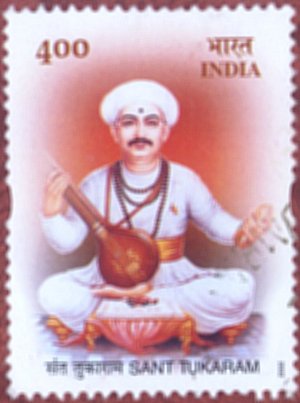Saint Tukaram
by Jyotsna Kamat
First Online: October 01, 2002
Page Last Updated: December 07, 2024
Born in Dehu village eighteen miles away from Pune, Tuka or Tukaram (c. 1598-1649 A.D.) is the most popular saint of Maharashtra. His parents were poor agriculturists of Maratha community but of pious and charitable nature. Their family deity was Vithoba of Pandarpur. Married at the age of fifteen, Tukaram lost his wife and son who died of starvation in a famine. His second wife Jeejabai was a capable but worldly woman who could not understand or appreciate her husband's spiritual aspirations, and took to nagging. They had two children.
As a petty farmer and trader, Tukaram innocent of worldly ways, and was cheated and humiliated in dealings. His life is a favorite topic for Keertankars (reciters and story tellers in praise of God) as it is full of dramatic incidents of misadventures of an unworldly man. He spent much of his spare time in contemplation and studying works of Jnaneswar, Namdev and Eknath, other famous saints of his native land. One guru, Raghava Chaitanya provided spiritual guidance in dream. After a period of contemplation in isolation and sadhana of severe kind, poetry dawned on him. His abhangs reveal the great inner struggle he had to undergo. But they also provide insight into stages of God-realization through the medium of Bhakti or devotion. The separation of the soul from the God gives intense pain to the devotee. This is known as Viraha to Hindu mystics and "Dark night of the soul" to Christian mystics. Tukaram expresses this condition in his abhang:
How can I know the right
So helpless am I
Since thou Thy face hast hid from
me
O Thou most high!
I call again and again at thy high
gate
None hears me, empty is the house,
and desolate.
He goes to the Lord as a beggar for alms--alms of divine love. He wanted to "taste sugar, did not want to become sugar". He wanted "bliss of communion with God; did not want to become one with him". This is the simplest interpretation of dualism in Bhakti cult.
© K. L. Kamat

Sant Tukaram
Detail from an Indian postal stamp
A Sadhaka (who has subdued passions) had to remain impervious to worldly happenings and concentrate on God according to Tukaram. He had learnt the hard way that material world and spiritual life could never coexist.
Singing and chanting of God's glory was a surest path of god-realization to Tukaram. Perhaps attainment of inner purity and complete self-surrender enabled him to visualize God's presence and his abhangs attest that he felt god's presence every where and in everything.
Caste and class do not come in the way of God-realization, he declared. There are many stories and miracles attached to Tukaram. One narrates of jealous Brahmins who admonished him, a non-brahmin, for writing prayer songs based on Vedas and puranas and forced him to throw the palm-leaf books on which he had composed abhangs. Since it was the local Dharmadhikari (administrator of religious affairs) who told him to destroy his compositions, Tukaram immersed all the books with great anguish in the river. He then sat meditating on a rock on the bank of Indrayani River.
After twelve days, Lord Panduranga is said to appeared to him and told that the songs will come back to him. Early next morning, copies of songs came floating to the rock on which Tukaram was lost in contemplation.
Chatrapati Shivaji came to know about this famous saint and his immense popularity of his abhangs which were recited by people of all castes and communities. He sent expensive presents through the entourage. But such worldly possessions had no meaning to the saint and he sent them back, much to the chagrin of his nagging wife. Later Shivaji himself came and sought his blessings from this great soul.
Tukaram sensed his end was nearing. He asked his wife whether she could accompany him on the last journey. "How can I leave behind the children, family, cattle and calves and come with you?" she retorted.
Devotees believe that Tukaram went to Indrayani river and entered forward in deep waters. His rug, cymbals and Tanpura came floating. But the body was missing. They believe that he went bodily to heaven.
![]()
Introduction | Important
Proponents | Pictures
Alvars | Shankara |Bridal Devotion | The
Alvars | Ramanuja | Madhva | Ravidas
Meerabai | Guru Nanak | Chaitanya | Purandaradas
Ramananda | Kabir | Tukaram | Kanakadas

